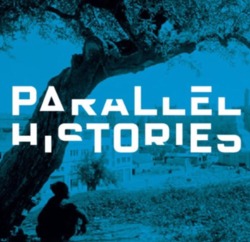Parallel Histories
 | |
| Formation | April 18, 2016 |
|---|---|
| Founder | Michael Davies |
| Purpose | To encourage more schools to teach controversial, challenging historical topics. |
| Headquarters | Edinburgh, Scotland EH7 4AN, GB |
| Fields | Education E-Learning |
Official language | English |
Key people | Michael Davies (EDITOR) Joshua Hillis (ASSISTANT EDITOR) Hugh Castle (SCHOOLS COORDINATOR) |
Main organ | Charity Organization |
| Website | parallelhistories |
Parallel Histories is a U.K. educational charity established in 2017.[1] It aims to address the phenomenon of schools becoming less willing over the last twenty years to teach subjects which are seen as controversial.[2][3]
The Parallel Histories methodology is to teach the history of a conflict by explaining the history from the point of view of both sides of the conflict, using interactive videos.[4] This methodology allows the students to learn both narratives at home, and the teachers to use the class time to show students how to analyse and evaluate critically the arguments and evidence on both sides.[5] It is an approach especially relevant to teaching the contested and controversial history of conflict which are still ongoing, and is consistent with the principles of the Flipped Classroom.[6]
The first series of videos covers the Arab-Israeli conflict.[7][8]
History
In 2017, the centenary of the Balfour Declaration, no school in the U.K taught about Britain's role in Mandatory Palestine at GCSE because there were no exam boards left offering it as a syllabus option.[9] One major exam board, Edexcel, included an option to study the history of the Arab Israeli conflict after 1945, but only 2000 students were enrolled on that course out of approximately 250,000 taking GCSE history in 2017.[10][11]
The Parallel Histories project was born from a school trip to visit Israel and the West Bank led by teachers from Lancaster Royal Grammar School.[12] A subsequent article about the impact of the trip in The Guardian[13] generated hundreds of comments both positive and negative, and prompted teachers involved to explore new ways of studying conflict.[14]
In 2008, a team at the Peace and Research Institute in the Middle East[15] led by Professor Eyal Naveh of Tel Aviv University[16] and his Palestinian colleague Professor Sami Adwan[17] produced a textbook: Side by Side: Parallel Histories of Israel-Palestine.[18] This textbook inspired the pedagogical approach of Parallel Histories.[19]
An Erasmus+ programme supports British, Irish and French schools in implementing the approach of Parallel Histories in schools.[20]
In 2015 Michael Davies, a history teacher, and founder of Parallel Histories was awarded a Winston Churchill Memorial Trust travelling fellowship.[21]
In 2017 Parallel Histories received the Margot Stern Strom grant for innovation from Facing History.
External Links
- Parallel Histories’s official website
- Parallel Histories on Linkedin
- Parallel Histories on Facebook
- Parallel Histories on Twitter
- Parallel Histories on Instagram
References
- ↑ "Charity overview". apps.charitycommission.gov.uk. Retrieved 2020-02-19.
- ↑ "The T.E.A.C.H. Report". The Historical Association. 2007-09-04. Retrieved 2020-02-19.
- ↑ "Independent and Critical Thinking in Education - RSA". The Royal Society of the Arts. Retrieved 2020-02-19.
{{cite web}}: CS1 maint: url-status (link) - ↑ "Enabling Faith Schools to tackle conflict in the Middle East" (PDF).
{{cite web}}: CS1 maint: url-status (link) - ↑ "IJE Round-Up". JCoSS. 2018-12-20. Retrieved 2020-02-19.
- ↑ Reidsema, Carl; Kavanagh, Lydia; Hadgraft, Roger; Smith, Neville (2017-02-27). The Flipped Classroom: Practice and Practices in Higher Education. Springer. ISBN 978-981-10-3413-8.
- ↑ "A new way to teach the Arab-Israeli conflict". The Jewish Chronicle.
{{cite web}}: CS1 maint: url-status (link) - ↑ "UK teacher\'s 'new approach' to teaching Mideast conflict | Mahmud el-Shafey". The Arab Weekly. Retrieved 2020-02-19.
{{cite web}}: CS1 maint: url-status (link) - ↑ "BBC Radio 4 - Sunday, Cremations in Bali, Teaching the history of the Middle East, Why wear the burka?". BBC. Retrieved 2020-02-19.
- ↑ Parkes, Alison (2017-03-28). "Exam boards drop Israel-Palestine from syllabus as schools fight shy of conflict". The Guardian. ISSN 0261-3077. Retrieved 2020-02-19.
- ↑ "Edexcel GCSE History Specification" (PDF).
{{cite web}}: CS1 maint: url-status (link) - ↑ "History". Lancaster Royal Grammar School. Retrieved 2020-02-19.
- ↑ "The Jewish story, the Arab story … and a plan by Mr Davies". The Guardian. 2015-10-06. ISSN 0261-3077. Retrieved 2020-02-19.
{{cite news}}: CS1 maint: url-status (link) - ↑ "What about Balfour? British students no longer studying Palestine-Israel | Mahmud el-Shafey". The Arab Weekly. Retrieved 2020-02-19.
{{cite web}}: CS1 maint: url-status (link) - ↑ "PRIME homepage - Peace Research Institute in the Middle East". vispo.com. Retrieved 2020-02-19.
- ↑ "Prof. Eyal Naveh". Tel Aviv University. Retrieved 2020-02-19.
- ↑ "Professor Sami Adwan". Just Vision.
{{cite web}}: CS1 maint: url-status (link) - ↑ ʻAdwān, Sāmī ʻAbd al-Razzāq; East, Peace Research Institute in the Middle (2012). Side by Side: Parallel Histories of Israel-Palestine. The New Press. ISBN 978-1-59558-683-4.
- ↑ "The professor who pioneer a non-partisan approach to Middle East history". The Jewish Chronicle.
{{cite web}}: CS1 maint: url-status (link) - ↑ "Sacred Heart Secondary School | Principal's Welcome". www.sacredheart.ie. Retrieved 2020-02-19.
- ↑ "Blog: Teaching parallel histories | Winston Churchill Memorial Trust". www.wcmt.org.uk. Retrieved 2020-02-19.
This article "Parallel Histories" is from Wikipedia. The list of its authors can be seen in its historical. Articles taken from Draft Namespace on Wikipedia could be accessed on Wikipedia's Draft Namespace.